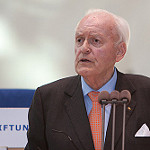Lessons from the Past, Visions for the Future: The Speeches of Roman Herzog

On the occasion of the death of Roman Herzog, Germany’s seventh federal president (1994-1999), we are pleased to present this volume of speeches AGI published in 1997 during a visit of President Herzog to Washington in July of that year. The introduction to this volume was written by Dr. Steven Muller, former President of Johns Hopkins University.
This selection of major addresses by Roman Herzog acquaints the reader with the vigorous personality and pragmatic mind set of the current President of the Federal Republic of Germany. The seventh person to hold that office since the Federal Republic came into being in 1949, Roman Herzog took office on July 11, 1994 and is now in the fourth year of his five-year term.
As Federal President, Herzog serves as head of state, but not as leader of the government. That role falls to the federal chancellor, whom the President appoints according to the majority mandate of the Federal Parliament. Thus the federal presidency is representative of the whole German people and therefore above political partisanship.
Nevertheless, as once pointed out by Walter Scheel, the fourth Federal President, “as long as this office is not hereditary, it is a political office.” And, indeed, like his predecessors, Roman Herzog came to the office after a rich career in politics and public service. The first Bavarian to serve as Federal President, Herzog was born in Landshut in 1934, studied law at the University in Munich and then became a professor of jurisprudence and the author of the leading commentary on the German constitution, the Basic Law. In 1973, however, he entered political life as a state secretary representing the state of Rhineland-Palatinate in Bonn. Five years later, he became Minister of Culture and then Minister of the Interior in the government of Baden-Württemberg and was also elected as a Christian Democratic Union (CDU) member of that state’s legislature.
In 1983, Herzog was appointed Vice-President of the Federal Constitutional Court in Karlsruhe, and in 1987 was named President of the Court—a position roughly analogous to that of Chief Justice of the United States Supreme Court. This was the position he left to become Federal President.
A primary service the federal president renders to the German people is to provide a symbol of unity, a national spokesman and—especially in difficult times—a national conscience and moral leadership. Accordingly, like his predecessors, President Herzog has addressed the major issues before Germany during his term. One can indeed follow the historical highlights of the Federal Republic in the subjects of major addresses by the successive federal presidents.
One issue, however—coming to terms with the national past—has been and remains a major item in the German national agenda ever since the end of the Second World War, and every federal president has confronted this issue while in office, including Herzog. It is worth noting that Herzog has a profound commitment to his evangelical faith and to the public work of the Evangelical Church. Until he joined the Constitutional Court, he was a member, then Vice-Chairman, and finally Chairman of the Evangelical Working Group of the CDU/CSU.
There is a pronounced moral tone in Herzog’s own judgement of the German past: see, for example, this sentence: “One is responsible not only for that which one does, but for that which one allows to happen” in the speech at Bergen-Belsen in April of 1995.
The bully pulpit which the federal presidency provides is also a quite perilous perch. Simply pious platitudes are too boring to suffice. Specific criticism of public actions risks appearing as an attack on the government in office, and that is out of bounds. General criticism must not be overdone lest it make the president sound merely like a common cold. Problems can be identified, but public programs to solve them are once again the government’s business and not the president’s. Each of the federal presidents in turn therefore has needed to find and then employ his own pitch, and this series of speeches reveals the success of Roman Herzog in doing so.
He is, for one thing, more comfortably focused on the future than any of his predecessors. Not one of them would have been likely, for example, to speak along the lines of “Breakthrough to an Information Society.” Without question, “Emergence into the 21st Century” is regarded as the most significant of President Herzog’s addresses to date, and it reveals him at the top of his form. His diagnosis that Germany suffers from loss of economic dynamism, ossification of society and an unbelievable mental depression is fully drawn. Yet, his ability to pose penetrating questions is matched by his ability to describe visions of Germany’s future. His concluding appeal to Germany to give itself a “shake” and to those who may have lost faith in the system to at least have faith in themselves is both appropriate and within bounds.
Former Chancellor Helmut Schmidt recently stated that, “We were lucky with Roman Herzog,” high praise from someone on the opposite side politically. Roman Herzog has clearly emerged as an affective and popular federal president with the forceful and penetrating mind and firm moral convictions displayed in these addresses. —Steven Muller








